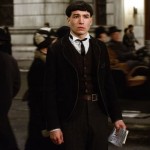Is Credence a Superhero, or Supervillain? Leaky’s ‘Fantastic Beasts’ Interviews #3: Ezra Miller

Nov 17, 2016
Actor Interviews, Fantastic Beasts Movie, Films, Interviews, News
Ezra Miller portrays Credence in Fantastic Beasts and Where to Find Them, and after our roundtable interviews with him in New York last week, thanks to the generosity of Warner Bros we had the opportunity to speak to him more at the roundtable interviews in London!
“How’s everybody doing?” Ezra asks, sitting back in his chair. After pleasantries are exchanged and the same question is asked of him he answers:
“I’m fantastic…. Beasts and Where to Find Them.”
When asked if he was proud of the film, and surprised by the final outcome, Ezra emanated immense positivity. The entire cast has given a glowing review of the filming process, and the final outcome is in our opinion – to use Ezra’s play on words – absolutely fantastic.
“I’m immensely proud.” He answered, “I think we all very proud of the film.
“A lot is left to the imagination until that moment when you see the premiere, but we all feel really happy with how it came out.”
Eddie Redmayne, Katherine Waterston, Alison Sudol and Dan Fogler had more experience with the challenges of CGI, and Ezra confirms this when asked about his experiences with the special effects department:
“I had less of a challenge than some of my fellow cast members because they dealt largely with imaginary material – the beasts they had to talk to and have loving relationships. For me obviously a lot of the work is more internal. [On Eddie, Alison, Katherine and Dan] I give many props to the masters you were just speaking with.”
***Spoiler warning: Don’t read on from here if you don’t want to know anything at all about the movie!***
Ezra has spoken before about the intensity of filming Beasts, and having to delve into deep places within himself to get to a place where he could get as close to Credence’s headspace as possible. Ezra plays an extremely pivotal character, and one that demonstrates a high level of inner torment and suffering, and Ezra said that Yates was immeasurably helpful in guiding him through this process.
One interviewer asked how Ezra would describe Credence, to which Ezra said he is “someone who has not got the love and attention they need”, and when asked to develop on the idea of Credence as a very human character with little choice in how he acts, Ezra says
“It’s powerful to explore these ideas of moral ambiguity and the idea that everyone’s got multitudes within them and often the circumstances of one’s life bring out one element or another, so there’s always a way to look at even the most horrific people you just want to hate and to have compassion for them.”
Developing on the idea of making the character his own, Ezra said he’s big on improvisation:
“It’s a school that I come from, to bring the spontaneity of improvisation to scripted film work.
“In almost every film I’ve ever done I have made up lines, changed words, improvised on the day. What we often say to the writer when we do that is “Hey, it’s not Shakespeare”. In this case… [Everyone laughs] It’s still not Shakespeare but it is J.K. Rowling. So no, I did not improvise at all, or change a word or seek to go outside the script even for a moment. I was really just working to honour what was in the pages themselves.
“It’s a good challenge to bring the spontaneous nature of improvisation to everything I do to a film where you’re following the script word for word, because that’s still the nature of interactions in life; we don’t know what we’re going to say until we say it.
“There was room for invention in terms of the way I chose to physically portray the character, but everything I did was honestly in the effort to fulfil the beautiful story that I found in the lines of the script. I did not feel like I needed to ‘fill in blanks’ in the writing.”
Credence has few lines in the movie, and speaks much more through the way he interacts with other characters. Coming from a place of abuse, repression and misunderstanding, Ezra’s focus on the physical aspects of acting for this character are clear in his portrayal of Credence on screen. He seems in constant pain, and often shakes and curls into himself as a show of internal struggle and physical torment and pain. Whilst at times a hard character to watch – as his suffering is extremely evident – Ezra’s clear understanding of the story behind his character is immensely effective, and allows for his portrayal to be not only moving, but helps shape other characters as the plot pivots around Credence’s torment.
On being required to act more physically than verbally in the film, Ezra was deeply respectful of the process:
“That can actually be very helpful – words lie while your body tells the truth, right? The body knows the truth, the body remembers everything, while the mind forgets. So for me I think that it’s a huge gift for an actor to be without dialogue.
“Some actors don’t feel this way. But I really do, I would love to make a silent movie at some point.”
Ezra will also portray Barry Allen – or The Flash – in DC’s Justice League next year. A character with supernatural abilities, and a character tormented by repressed magic have given Ezra a taste for what it is to act a character with magical abilities:
“These are the roles I would cast myself in as a young child, so I feel like I come well prepared to play people with preternatural abilities”
Credence is left with an uncertain future in the movie, with only a wisp hinting at his survival. Leaky wanted to know – after he’d found out Credence would play a more pivotal role in future Fantastic Beasts movies – if he was looking forward to seeing how his character would develop as a result of this, and if he hoped for any particular story to develop:
“I don’t know if that’ll happen or not! That was a sneaky way to ask that question” He says with a grin. I can’t help but ask, but with utter respect for the privacy of the filming process – we love surprises!
“I don’t know if he will develop, that could be it for Credence – he does get blasted into a million pieces”
We were keen to know the extent to which his character was blasted into oblivion… After the conflict, Newt sees one tiny ‘piece’ of Credence struggling to float away, definitely looking more alive than the other ‘pieces’. If he’d survived this long, is it possible he could survive further? Ezra’s lips were, understandably, locked shut:
“If you get blown up and one piece of you is left on the sidewalk, I hope that what you say is true, and that that means you survived the explosion for your sake.” [Laughs] “But yeah, I really don’t know the future – I’m not Professor Trelawney!” He says with a sly grin.
With a laugh we drop the topic of the future of the series, put away our tealeaves and accept that we’ll have to live in hope. David Yates has said that Credence in particular will become a particularly important plot device in the future, along with Grindelwald, so here’s hoping that means the return of Ezra, even in any small way!
Fantasy films are growing increasingly popular, along with superhero movies, both of which Ezra has experience of. One interviewer was keen to know why he thought this popularity had grown in recent years. Ezra says the stories have been popular for longer than we may realize:
“I don’t feel like this is a contemporary phenomenon. I think if you look at any of the codified mythologies from any people of the earth, the central mythologies are about people who are part animal, part something other, something ethereal, and something wondrous. We’re part earth and part sky, half-snake half-bird. This is the mythology! We explore this concept endlessly, and I think you can see this across all the pantheons of gods and all the stories and throughout all of theology and in all mythology you see this theme. I don’t think it’s new for superheroes to be popular! I think this is the human condition that we struggle with. There are at least two things inside us, and they don’t always get along. It’s hard to find cohesion in ourselves, and that’s the challenge of being a human being. It’s almost all right there, right? It’s almost the human, and the being. “
Ezra thinks you can look at Credence as a hero if you want to, but also says Fantastic Beasts is more complicated than just heroes vs villains:
“He’s probably more of a supervillain if you’re splitting it down into dualities and dichotomies. He’d probably fall more incidentally on the villain side of things, but this story doesn’t really deal with a strict duality of hero and villain like that.”
“They say that the brightest light casts the darkest shadow, and so on, but I think moreover there’s just an interest to approach human beings with compassion and and effort to understand, which is timely, because more and more it seems that people are willing to confront another human being and reject them, and hate them, or fear them based on title, or these primitive ideas of what makes us different, instead of the effort to understand what makes us all similar. “
One interviewer wanted to know if this sense of timeliness was coming from a place of post-election pessimism. Ezra said he would not call himself pessimistic, but also that he doesn’t put much faith in the system he was raised in:
“I grew up during Bush administration, I think that a lot of people are freaking out in the states because of the election of Donald Trump but for me this is a very good opportunity for America to look in the mirror, because if we really examine our history this is not a new phenomenon.
“We are a nation founded in genocide – slavery and genocide is our roots, bigotry is our history, Abraham Lincoln, the day after he sign the emancipation proclamation, attended one of the largest hangings of Native American people in US history. From the Spanish-American war all the way to the wars we perpetuate now, I don’t think you could call me recently pessimistic. I’ve never been optimistic about what America is or who we are as a nation, so I think we need radical change from what we were.
“I don’t believe in the Founding Fathers. I don’t respect them; I don’t respect the United States of America as an entity. In my mind it’s delusional, it’s made up, and it doesn’t really exist. The land belongs to Native American people – I call it Turtle Island. I don’t surrender any of the power that is mine to the government.”
On Donald Trump’s election, Ezra said he thought he was able to rally a massive following because “people feel that the system is broken”:
“They’re tricked by the most basic marketing psychology, and they can be – they’re susceptible to that – because they’re extremely disillusioned with a broken system that doesn’t work for them. So they’re right in many ways, but they’ve been deceived by a sociopath, into following someone who does not have their interests anywhere close to his heart. You think Donald Trump cares about working class people in the United States? Give me a break!
You guys got tricked, and this is the history of Fascism – it comes when people feel destabilized and insecure. When people who have formerly been the people of privilege in a country suddenly feel that status slipping, and they get scared, and that fear is so easily directed into this type of bigotry and hatred, it’s so simple. It’s so easy to just blame Mexicans for all your problems instead of confronting yourself, confronting the history of the system you live in, confronting the ruling elite. “
The theme of repression and hatred is extremely prominent in the film, and in the character of Credence. One interviewer wanted to know if Ezra believed in the power of film and story to be didactic in such a complicated manner – to teach people about how unhealthy repression and how exclusionary hatred and prejudice is, and to teach compassion and empathy instead.
Ezra answered quite simply: with a quiet, smiling, resounding “Yes.”
“I put all of my faith in the power of story. It would be a silly question to ask a child if a story impacts how they act or think, because we know that stories effect children and change the way that they think, we know stories effect us and change the way that we think. All we have is our perspective, and actually, everything we know is the narrative that we create – the story that we tell. Collectively and personally. There’s nothing but story.”
After complimenting his angular blazer with stripy detail on the collar and cuffs, we said our goodbyes, and our thank you-s. Ezra sauntered out of the room, waving with one hand, and in the other holding a tiny milk-bottle (filled with what looked like strawberry milkshake) with an accompanying red and white striped straw inside, as an alternative to David Yates’ cappuccino, Eddie Redmayne’s latte and Alison Sudol’s tea.
We hope you’re all looking forward to seeing the film tomorrow, November 18th!





